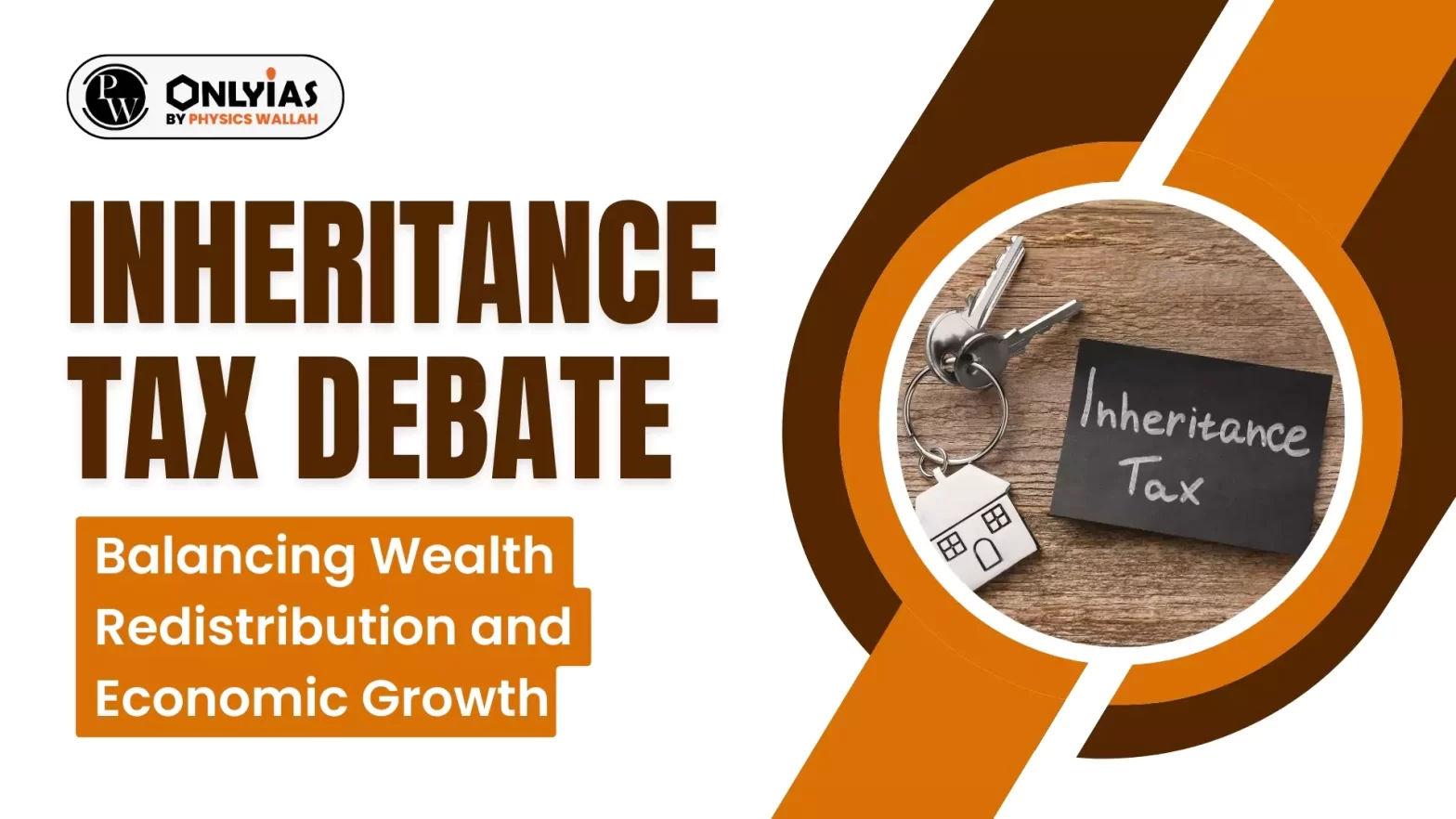Context
A prominent political leader of India’s opposition party has expressed interest in the proposed legislation on inheritance tax in the United States.
About Inheritance Tax/ Estate Tax
- Definition: It is a tax levied on the total value of money and property of a deceased person before it is distributed to their legal heirs.
- Calculation: The tax is typically calculated based on the value of the assets left behind after any exemptions or deductions.
- Objective: The tax was introduced with an attempt to reduce unequal wealth distribution and increase tax collections.
Enroll now for UPSC Online Course
Arguments in Favour of Inheritance Tax
|
Arguments Against of Inheritance Tax
|
- Reduce inequality by redistributing wealth
- Generate revenue for government welfare and development programs
- Ensure the wealthy contribute more to society
- Encourage charitable giving and productive use of wealth
|
- Its potential negative impact on entrepreneurship, Tnvestment, and economic growth
- The risk of capital flight to more favorable tax jurisdictions
- The limited revenue it may generate due to loopholes and exemptions
- The additional burden it places on families during a difficult time
- The administrative complexity and cost of implementing such a tax
- Its potential unsuitability for developing countries like India that need pro-growth policies
|
History of Inheritance Tax in India
- Estate Duty: India had inheritance tax in the form of “estate duty” from 1953.
- Taxation Strain: This was the same regime when the combined levy of income tax and wealth tax exceeded the income earned by an individual.
- India’s High Estate Duty Policy: The mindset was to levy a very high rate of tax and if anything was left after payment of these taxes, which you want to inherit for future generations, the state would confiscate a bulk of it by levying estate duty.
- Estate Duty Abolition: The duty was levied at a maximum marginal rate of 85% when it was abolished in March 1985.
Challenges in Introducing Inheritance Tax
- Tax Moderation and Modernization in India: Income tax rates have been moderated, and alternative regimes for personal and corporate tax have been introduced with lower tax rates, lower exemptions and deductions, focus on better compliance, data analytics, etc
- India’s Rising Taxpayers and Buoyant Revenue: The number of taxpayers continues to rise by the day and there is a significant buoyancy in the direct tax and goods and services tax collections exceeding Budget estimates.
- India remains a bright spot in the global economic environment and our GDP is growing at the highest level among the large economies.
- Startup Powerhouse: India is the third-largest ecosystem for start-ups with many unicorns and more in the making.
- India’s Decade of Growth: The last decade has seen significant focus on infrastructure development and massive strides towards rapid expansion of our GDP aimed at making India a developed nation.
Global Examples of Inheritance Tax
- Inequality and Resource Scarcity: Internationally, the Organization for Economic Cooperation and Development (OECD) and G20 ministers have expressed concerns about a distribution mismatch and scarcity of resources in the hands of the poor.
- OECD Wealth Transfer Tax Trends: Twenty-four out of 36 OECD countries levy tax on the transfer of wealth of the deceased.
- Whereas 10 OECD countries such as Austria, Sweden, New Zealand and Australia have abolished the levy since 2000.
- Similarly, developing countries such as Brazil, South Africa, and the Republic of Korea also consider inheritance tax as a measure to remove the distribution mismatch.
- Estate Tax Rates: The rate of tax applicable in Japan is as high as 55%, compared with the United States of America, the Netherlands, and United Kingdom at around 40%, whereas Algeria taxes at a rate that can go as low as 5%.
Challenges Associated with Inheritance Tax
- Revenue Challenge: Internationally, inheritance taxes have failed to achieve the stated objectives and their collections are also below par.
- Inheritance taxes contribute below 1.5% of the total revenue in OECD countries
- Loopholes and Administrative Costs: The loopholes and the administrative cost involved in implementing inheritance tax outweigh the benefits of economic equality.
- Different Stages of Development : Developed countries such as the US are at a different stage of their economic journey, backed up by a robust social security framework and with different imperatives compared to India.
Way Forward: Balancing Investment and Compliance with Inheritance Tax
- Balancing Investment and Compliance: India needs a framework which boosts investments, entrepreneurship, wealth creation, and a moderate rate of tax promoting compliance.
- Prioritizing India’s Economic Imperatives: It may be prudent not to get carried away by the imperatives of developed economies and instead focus on our own priorities.
- Addressing Economic Inequality: Income inequality needs to be addressed with varied mechanisms such as wider access to education and skill development, easy access of finance for a wider entrepreneurial class, infrastructure development, removing supply chain bottlenecks, agricultural and land reforms, rural job creation, etc.
Enroll now for UPSC Online Classes
Conclusion
The discourse surrounding inheritance tax highlights the wider conversation on the distribution of wealth and achieving economic fairness. Despite facing opposition, advocates contend that it represents a crucial stride toward fostering a more equitable society.
Also Read: India’s Net Direct Tax Collection Rises 20.25% YOY
![]() 27 Apr 2024
27 Apr 2024

